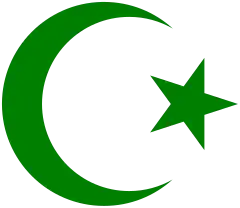Political Islam
Political Islam is any interpretation of Islam as a source of political identity and action.[1] It can refer to a wide range of individuals and/or groups who advocate the formation of state and society according to their understanding of Islamic principles. It may also refer to use of Islam as a source of political positions and concepts.[2] Political Islam represents one aspect of the Islamic revival that began in the 20th century, and not all forms of political activity by Muslims are discussed under the rubric of political Islam.[1] Most academic authors use the term Islamism to describe the same phenomenon or use the two terms interchangeably.[1]. There are new attempts to distinguish between islamism as religiously based political movements and political Islam as a national modern understandings of Islam shared by secular and islamist actors[3] (Cesari 2018)
| Part of a series on: Islamism |
|---|
 |
|
|
Development of the term
The terminology which is used for the phenomenon of political Islam differs among experts. Martin Kramer was one of the first experts who started using the term “political Islam” in 1980. In 2003, he stated that political Islam can also be seen as tautology because nowhere in the Muslim world is a religion separated from politics.[4][5] Some experts use terms like Islamism, pointing out the same set of occurrences or they confuse both terms. Dekmejian was amongst the first of the experts who made remarks on politicisation of Islam in the context of the failure of secular Islamic governments while he uses both Islamism and Fundamentalism at the same time (rather than political Islam).[6]
The term political Islam has been used in connection with foreign communities, referring to the movements or groups which have invested in a broad fundamentalist revival that is connected to a certain political agenda.[4] M. A. Muqtedar Khan incorporates into political Islam all the Islamic movements promoting a political system based solely on Islam which must be followed by every Muslim.[7] Some of the experts also use other descriptive terms in order to distinguish various ideological courses within political Islam: conservative, progressive, militant, radical, jihadist etc.[1]
References
- Voll, John O.; Sonn, Tamara. "Political Islam". Oxford Bibliographies Online Datasets. doi:10.1093/obo/9780195390155-0063.
- Krämer, Gudrun. “Political Islam.” In Encyclopedia of Islam and the Muslim World. Vol. 6. Edited by Richard C. Martin, 536–540. New York: Macmillan, 2004. via Encyclopedia.com
- Kramer, Martin (2003-03-01). "Coming to Terms: Fundamentalists or Islamists?". Middle East Quarterly.
- Kramer, Martin (1980). "Political Islam". The Washington Papers. VIII.
- Dekmejian, R. Hrair (1980). "The Anatomy of Islamic Revival: Legitimacy Crisis, Ethnic Conflict and the Search for Islamic Alternatives". Middle East Journal. 34 (1): 1–12. JSTOR 4325967.
- Khan, Muqtedar. (2014). What is Political Islam? E-international Relations.
Cesari,J. (2018): What is Political Islam?https://www.rienner.com/title/What_Is_Political_Islam/ (Lynne Rienner Publisher, Boulder)
Further reading
- Ankerl, G.(2000): Coexisting Contemporary Civilizations. Arabo-Muslim, Bharati, Chinese, and Western. (INU PRESS, Geneva.)
- Hamid, S. & McCants, W. (2016). Rethinking Political Islam. Brookings Institution.
- Hoover Institution. (2017). Islamism in Maritime Southeast Asia. The Caravan, 1715.